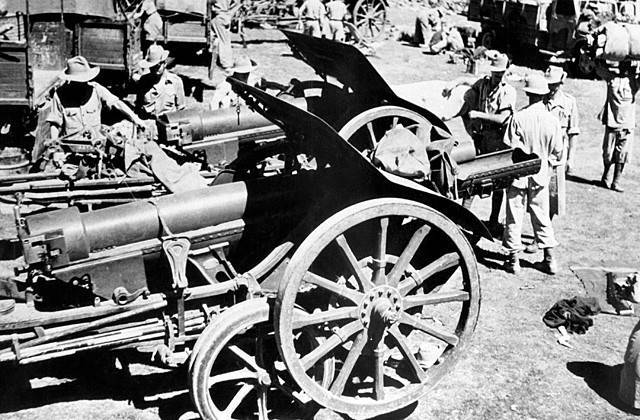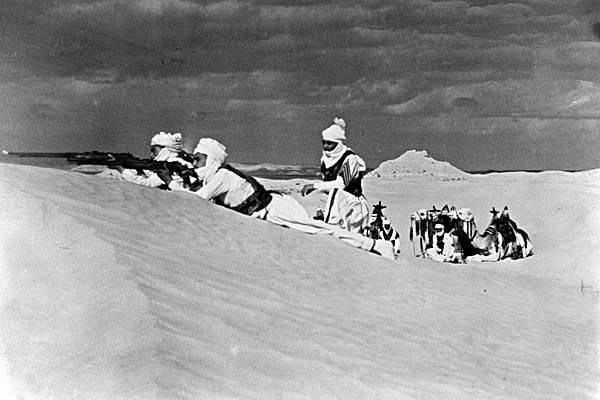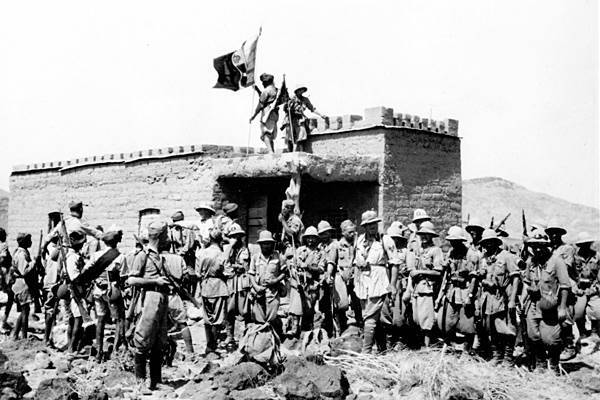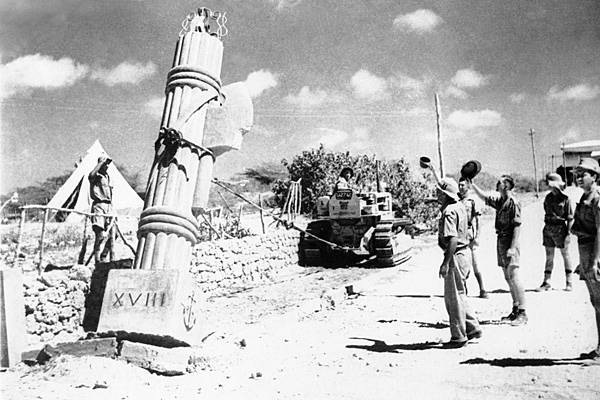Somali campaign: the collapse of the Italian blitzkrieg

Why the Duke d'Aosta in 1940's stopped a step away from victory in Africa and then in the Middle East
In Russia, people used to think that the main battles in World War II took place on the Eastern Front, that is, in the confrontation between Germany (and its satellites and allies) and the USSR. By the number of casualties and scale, of course, these were the most ambitious battle. However, equally important battles took place in other parts of the world. Yes, they were dozens and hundreds of times inferior in terms of the number of troops and equipment to the theater of military operations on the Eastern Front, but this did not make them less significant. The Russian Planet decided to recall some of these campaigns. The first story is about the front in Somalia, where in 1940 Italian troops came together on the one hand, and on the other, the British (as well as troops from their colonies and dominions).
Native troops did not have ten years
Italians penetrated into Africa one of the most recent European colonialists. They focused on East Africa: in 1896, they occupied Eritrea, in 1925 — part of Somalia, in 1936, in Ethiopia; 1911, the Italian became Libya. These territories, called Italian East Africa (IVA; Africa Orientate Italiana), were placed under the control of the viceroy of Ethiopia, Duke d'Aosta.
Duke, unlike Mussolini and the fascist elite of the country, was a realist. He understood that war with England (and, possibly, with France) was inevitable, but Italy needed at least 10 — 15 years to put in order not only its troops, but also the colonial garrisons in Africa that could fight on equal terms with adversary.
The Duke d'Aosta did not invent anything new: he simply decided to copy the English and French experience of the drill of the native troops. Already by World War I, England and France had trained hundreds of thousands of people in colonial brigades made up of Africans, Hindus, and other natives. Even after two or three years of training, their fighting qualities were low, but they had one big plus: there were many natives, it was not a shame to spend them on the front line. In the First World Ratio of those killed on the Western Front in open battle, Senegalese and Germans usually had 5 — 8: 1 — this suited the general staffs of England and France quite well.
The Duke d'Aosta hoped that the African campaign would be a battle of some natives against others, led by the Italians, on the one hand, and by the British and French, on the other. And so it happened, only the Italian viceroy did not have the 10 — 15 years he had hoped for (and the French had left the war earlier, surrendering to the Germans).
By 1940, the Italian command had only the initial training of the Ethiopians (the Eritreans and Somalis, whom the Italians tried to use in the auxiliary forces, were significantly inferior to the Ethiopians).
Window to the Middle East
The forces of d'Aosta in 1940, on the whole, consisted of 256 thousands of people, thousands of 182 of whom were members of the native formations (the Italians called them "indigenous"). As mentioned above, the native units differed greatly in their qualities: from well-trained Ethiopians to poorly trained irregular units, called “gangs” (yes, that’s what they were officially called in Bande).
The Italian troops, as it was believed, had excellent combat training: they had fought in East Africa for five years now - since the conquest of Ethiopia in 1936.

The European units in the IIA included the elite division of the Grenadiers of Savoy, which was one of the oldest units of the Italian army. Another division was formed on the spot and was called “Africa”. It consisted of several legions of black-shirts from the fascist militia recruited among the white Italian colonists - these troops had a high fighting spirit. The rest of the Italian troops of d'Aosta were made up of formations of various auxiliary units, such as the Carabinières, the financial guard, the police of Italian Africa and the naval forces.
If he could rely on the troops of d'Aosta, then he had little modern military equipment: looking ahead, let's say that this was one of the main reasons for the defeat of the Italians. At his disposal, for example, there were only 22 medium tank and about 150 aircraft.
The Italians were confronted with only about 15 thousands of Englishmen in Somalia, Sudan and neighboring Kenya (if we discard the native units, then the Italians were about 40 thousands against them).
There were few English forces in Africa and the Middle East in the first half of 1940: 36 thousands of soldiers in Egypt, 9 thousands in Sudan, 5500 in Kenya, 1475 in British Somalia, 2500 in Aden, 27 500 in Palestine and 800 in Cyprus. They were opposed by the 215 of thousands of Italians in Libya, under the command of Marshal I. Balbo and 256 of thousands in Italian East Africa. It would seem that the defeat of England in this region is inevitable.
Italian East Africa and the troops stationed in it posed a strategic threat to the Red Sea. Now it was the main sea route for Britain to the Middle East (after the actual closure of the Mediterranean Sea for merchant shipping due to a threat from the Italian military fleet и aviation).
Moreover, the plans of the Italians (and the Germans) was not only the overlap of the Red Sea, but also the conquest of Egypt and going farther east - to Iraq. Inevitably in this situation, as the Italians and Germans had hoped, there would have been an Arab uprising on the Arabian Peninsula and the entrance to the war on the side of the fascists of Turkey and Iran would have been at the end of 1940, at the beginning of 1941. As a result, in June 1941, the USSR would have received the Caucasian front, and this would put an end to our country - a war on two fronts (or even three - also against Japan in the Far East), the Soviet Union would not have sustained two three months.
Go south when you had north
10 June 1940, the fascist Italy entered the Second World War. And at dawn the next day, a group of eight British Wellesley bombers from the 223 squadron headed for the Italian Guru airbase in Ethiopia. As a result, the repeated superiority of the British in the air had a decisive influence on the Somali campaign.
But so far, in the summer of 1940, the Italians were using their superiority in manpower.
In August, the Italians 1940, after a powerful attack overthrew the British - the remnants of the English garrison were forced to flee to the other side of the Red Sea, to Yemen. The narrow entrance to the Red Sea in the Djibouti region was actually blocked off. At the same time, the Italians launched an offensive against the Anglo-Egyptian Sudan (occupying the strategically important cities of Kassala and Galabat). The commander of the British forces in Sudan, Major General Platt, at that time had only three British infantry battalions stationed in Khartoum, Atbara and Port Sudan in the whole of this vast area.

It seemed a little more, and they would have opened the way to Cairo, to the east of which they would join the Libyan Italians. And then absolutely transcendental horizons opened up in the form of an offensive by the Italians and Germans in the Middle East and Iraq, as, by the way, this was planned by the headquarters of these two countries.
The British themselves believed that in a month the Italians from the south would approach Egypt. During this time, Britain would be able to transfer there only not the best-quality 3 — 4 Indian divisions.
But the Italians undertook a completely insane move, which World War II historians cannot explain until now: instead of advancing north, to Sudan and Egypt, they threw their forces south - to conquer English Kenya, which was absolutely useless in strategic terms. Subsequent, after the blitzkrieg, 2 — 3, the month-long trampling of the Italians, allowed the British to withdraw from the strike and to assemble several combat-ready divisions in their colonies.
Thus, by October-November 1940, the number of British forces in Kenya increased to 75 thousand people: 27 thousand South Africans, 33 thousand from East Africa, 9 thousand from West Africa and about 6 thousand British. On the Arabian Peninsula, the British concentrated up to 60 thousands of people - parts from India and Australia. And most importantly - during this time they transferred aviation here.
In Sudan, by December 1940, the British now had 28 thousands of people, including the Indian 5 Division. The Indian 4 Division was planned to be transferred there after the completion of the first stage of the counter attack against the Italians in North Africa. A battalion of tanks of the 4 Tank Regiment was sent to Sudan. In addition, from the Sudanese, the British managed to assemble significant indigenous units (up to 40 thousand people).
Aviation decided everything
The fate of the Italians in East Africa was predetermined. Only a few Italian units could offer real resistance to the British, while the native troops simply ran away in serious clashes; replenishment from Italy could not come. Their army fell into the “bag” —significant British forces now opposed them from the south (in Kenya), from the east (through the Gulf of Aden) and from the north (in Sudan). Of course, it would be possible to break through to the West - through southern Sudan to the savannas of modern Chad and the CAR. But what was there to do next to two hundred thousand soldiers without supplies and bases?
Italy, despite significant losses in the first months of the war (up to 3 thousands of Italians and 20 — 25 thousands of natives), continued to have a significant army, and the British reasonably decided that first, before the main land battles, it was necessary to exhaust the enemy thoroughly with air strikes. This is where the superiority of the British in aviation, in which they surpassed 1940 / 41 by 2 — 2,5 times by winter (and the Italians mostly had fighter aviation; the British exceeded them by 3 — 4 times, as well as the Italians were deprived of supplies spare parts for aircraft repair).
Already in the first days of the war, the priority goal of the British air strikes - airfields. The whole campaign, both sides will try to bomb the enemy aircraft on the ground - too few fighters, and their technical and tactical data do not always allow to intercept high-speed (by the standards of the time) bombers - "Blenheim" and "Spaviero."
The English managed to do it better. The only thing that the Italians could oppose to them was the personal heroism of the pilots. In their ranks was the famous to all of Europe ace - Mario Vicintini, who was still in the Spanish Civil War (he fought on the side of Franco) received the nickname Red Al (he flew the red Fiat). In the end, Vincintini shot down the 17 of the British aircraft for the entire campaign, and his squadron - the enemy's 50 machines. Mussolini posthumously awarded Mario Vicintini the "Gold Medal" - the highest award of fascist Italy.
And yet the forces were not equal. By the winter of 1940 / 41, the British shot down 80% of Italian aviation, and after that they began methodically destroying enemy bases, fuel depots and manpower. Powerful bombardments (according to African standards, of course) did not psychologically sustain the native parts of the Italians. By January, 1941, before 50, thousands of aboriginal troops deserted, while the rest surrendered from the first minutes of the battle.
Deserved honorary surrender
Fighting in February 1941, the years were still fierce. February 1 The 5-I Indian division of English General Platt after a two-day battle of Akordat defeats the forces of General Frushi. Most of the Italian units are moving to Keren, a mountain fortress dominating the eastern approaches to the strategic port of Masaua. From this date, the war for the Italians becomes only defensive.

From February 3 to March 27, the 1941 of the year was the biggest battle for the entire campaign in Somalia - the Battle of Keren. The Italian garrison numbered 30 thousands of people with 144 guns. The bulk of the infantry were the native battalions, but there was also an elite division of the Grenadiers of Savoy and a battalion of alpine shooters Work Amba (Uork Amba). The defenders, who were well-fortified positions in the mountains, with incredible courage and perseverance fought off the attacks of the 4 and 5 of the Indian divisions. Among Italians, the number of dead reached 3 thousands of people. The British lost 500 people killed and 3 thousands wounded.
Such a large loss ratio - 6: 1 in favor of the British - is explained not only by their complete air supremacy, but also by “shell hunger” that hit the Italians: by the end of the battle, they could only afford 5 — 6 shells per gun per day.
5 April Italians evacuated Addis Ababa, the capital of Ethiopia, which was declared an "open city". The remaining Italians scattered on a few mountain fortified items. 6 April 12-I African Division entered Addis Ababa. During the 1700 mile march to this city, she almost met no resistance, losing just 500 people.
7 April fell Asmara, the capital of Eritrea, under the blows of the northern forces of Platt. 8 April, General Platt captured Massawa. The threats to the Allied maritime communications no longer existed: the war was in fact over. The British captured 40 thousands of Italian soldiers (of which the Italians themselves were about 10 thousands). The 4 Indian Division was ordered to return to the Western Desert — a little later, the rest of the British units that took part in the Somali campaign would catch up on the North African front — this largely determined the course of the battle in favor of the British.
The Duke of Aosta fought until May 1941 - 17 May ended a two-week siege of Amba-Alagi fortress. The seven thousand strong garrison capitulated. The last to leave was Duke d'Aosta; The British gave him the honorable conditions of surrender.
De jure the war in East Africa ended November 27 1941 of the year - on this day, General Nazi and 23 thousands of his soldiers laid down arms in the Gondar fortress.
In total, about 30 thousands of Italians were captured (up to 5 thousands of them were killed during the campaign) - the British gave all of them half-freedom - free placement without weapons in the Italian colonies. True, about 4 thousands of Italians from the Alpine units went into the mountains and forests of Ethiopia and waged a partisan struggle there until the autumn of 1943.
Several days remained before the battle of Moscow and the first victory of the Soviet troops over the Germans, and formally the first Allied victory over the troops of the Axis countries was won several thousand kilometers to the south. But it was not an East African campaign. About the very first victory of the Allies will be our next story.
Information